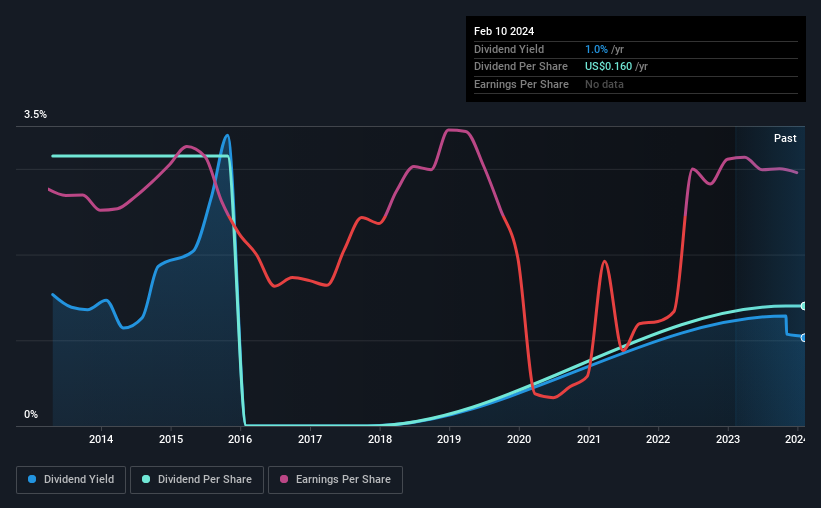Four Days Left To Buy Twin Disc, Incorporated (NASDAQ:TWIN) Before The Ex-Dividend Date
Twin Disc, Incorporated (NASDAQ:TWIN) is about to trade ex-dividend in the next four days. Typically, the ex-dividend date is one business day before the record date which is the date on which a company determines the shareholders eligible to receive a dividend. It is important to be aware of the ex-dividend date because any trade on the stock needs to have been settled on or before the record date. Meaning, you will need to purchase Twin Disc's shares before the 15th of February to receive the dividend, which will be paid on the 1st of March.
The company's next dividend payment will be US$0.04 per share, on the back of last year when the company paid a total of US$0.16 to shareholders. Looking at the last 12 months of distributions, Twin Disc has a trailing yield of approximately 1.0% on its current stock price of US$15.54. We love seeing companies pay a dividend, but it's also important to be sure that laying the golden eggs isn't going to kill our golden goose! That's why we should always check whether the dividend payments appear sustainable, and if the company is growing.
See our latest analysis for Twin Disc
Dividends are usually paid out of company profits, so if a company pays out more than it earned then its dividend is usually at greater risk of being cut. Twin Disc paid out just 5.5% of its profit last year, which we think is conservatively low and leaves plenty of margin for unexpected circumstances. Yet cash flows are even more important than profits for assessing a dividend, so we need to see if the company generated enough cash to pay its distribution. Luckily it paid out just 1.8% of its free cash flow last year.
It's positive to see that Twin Disc's dividend is covered by both profits and cash flow, since this is generally a sign that the dividend is sustainable, and a lower payout ratio usually suggests a greater margin of safety before the dividend gets cut.
Click here to see how much of its profit Twin Disc paid out over the last 12 months.
Have Earnings And Dividends Been Growing?
Companies with falling earnings are riskier for dividend shareholders. If business enters a downturn and the dividend is cut, the company could see its value fall precipitously. That's why it's not ideal to see Twin Disc's earnings per share have been shrinking at 3.2% a year over the previous five years.
Another key way to measure a company's dividend prospects is by measuring its historical rate of dividend growth. Twin Disc has seen its dividend decline 7.8% per annum on average over the past 10 years, which is not great to see. While it's not great that earnings and dividends per share have fallen in recent years, we're encouraged by the fact that management has trimmed the dividend rather than risk over-committing the company in a risky attempt to maintain yields to shareholders.
Final Takeaway
Has Twin Disc got what it takes to maintain its dividend payments? Twin Disc has comfortably low cash and profit payout ratios, which may mean the dividend is sustainable even in the face of a sharp decline in earnings per share. Still, we consider declining earnings to be a warning sign. While it does have some good things going for it, we're a bit ambivalent and it would take more to convince us of Twin Disc's dividend merits.
In light of that, while Twin Disc has an appealing dividend, it's worth knowing the risks involved with this stock. For example - Twin Disc has 1 warning sign we think you should be aware of.
Generally, we wouldn't recommend just buying the first dividend stock you see. Here's a curated list of interesting stocks that are strong dividend payers.
Have feedback on this article? Concerned about the content? Get in touch with us directly. Alternatively, email editorial-team (at) simplywallst.com.
This article by Simply Wall St is general in nature. We provide commentary based on historical data and analyst forecasts only using an unbiased methodology and our articles are not intended to be financial advice. It does not constitute a recommendation to buy or sell any stock, and does not take account of your objectives, or your financial situation. We aim to bring you long-term focused analysis driven by fundamental data. Note that our analysis may not factor in the latest price-sensitive company announcements or qualitative material. Simply Wall St has no position in any stocks mentioned.

